F.B.I. Warns Of Russian Plans To Interfere In 2020 Elections
Counter-Intelligence officials are warning that Russia is preparing another election interference campaign for the 2020 election.
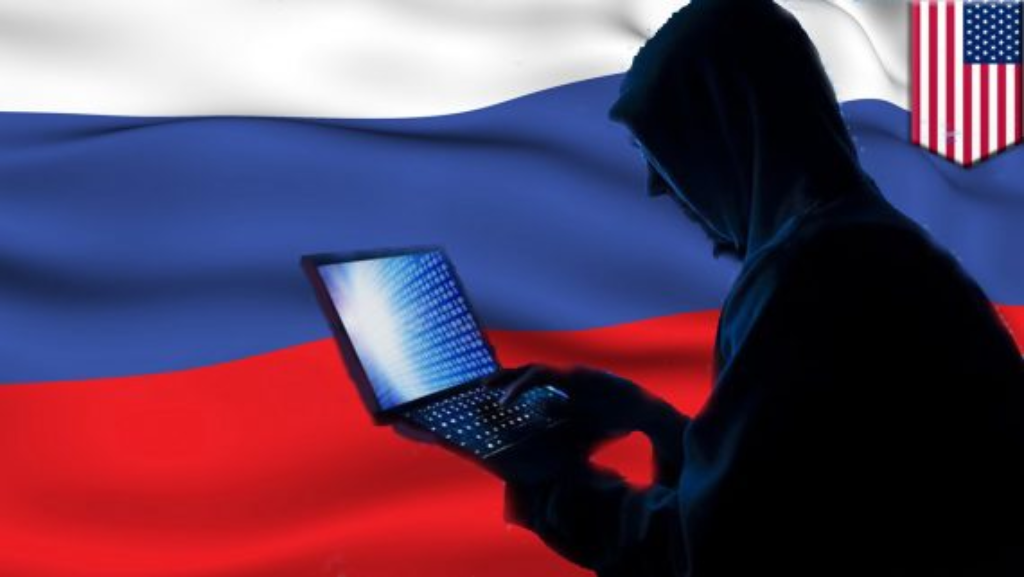
Following up on James Joyner’s post this morning about the ethics of foreign interference in elections, The New York Times reports that the Federal Bureau of Investigation is warning Federal and state authorities that the Russian government is preparing to interfere with the 2020 election just as it did in 2016:
WASHINGTON — The F.B.I. director warned anew on Friday about Russia’s continued meddling in American elections, calling it a “significant counterintelligence threat.” The bureau has shifted additional agents and analysts to shore up defenses against foreign interference, according to a senior F.B.I. official.
The Trump administration has come to see that Russia’s influence operations have morphed into a persistent threat. The F.B.I., the intelligence agencies and the Department of Homeland Security have made permanent the task forces they created to confront 2018 midterm election interference, senior American national security officials said.
“We recognize that our adversaries are going to keep adapting and upping their game,” Christopher A. Wray, the F.B.I. director, said Friday in a speech in Washington, citing the presence of Russian intelligence officers in the United States and the Kremlin’s record of malign influence operations.
“So we are very much viewing 2018 as just kind of a dress rehearsal for the big show in 2020,” he said.
Mr. Wray’s warnings came after the report by the special counsel, Robert S. Mueller III, laid out in hundreds of pages of detail the interference and influence campaign carried out by Russian operatives in the 2016 election.
While American officials have promised to continue to try to counter, block and weaken the Russian intelligence operations, they have complained of a lack of high-level coordination. President Trump has little interest or patience for hearing about such warnings, officials have said.
Mr. Trump views any discussion of future Russian interference as effectively questioning the legitimacy of his 2016 victory, prompting senior officials to head off discussions with him. Earlier this year, the White House chief of staff told Kirstjen Nielsen, then the homeland security secretary, not to raise the threat of new forms of Russian interference with Mr. Trump, current and former senior administration officials have said.
But outside of meetings with Mr. Trump, intelligence officials have continued to raise alarms. Officials including both Mr. Wray and Dan Coats, the director of national intelligence, have said Russia has aimed its influence campaigns at undermining faith in American democracy.
“What has pretty much continued unabated is the use of social media, fake news, propaganda, false personas, etc. to spin us up, pit us against each other, to sow divisiveness and discord, to undermine America’s faith in democracy,” Mr. Wray said on Friday. “That is not just an election-cycle threat. It is pretty much a 365-day-a-year threat.”
In response to growing threats from Russia and other adversaries, the F.B.I. recently moved nearly 40 agents and analysts to the counterintelligence division, the senior bureau official said in an interview this month. Many of the agents will work on the Foreign Influence Task Force, a group of cyber, counterintelligence and criminal experts. Officials have made that task force, initially formed on a temporary basis before the midterm elections, permanent.
The Department of Homeland Security made its midterm election task forces permanent, folding them into an election security initiative at their National Risk Management Center. And the National Security Agency and the United States Cyber Command have also expanded and made permanent their joint task force aimed at identifying, and stopping, Russian malign influence, officials said.
Intelligence officials have said Russia has kept up its interference operations since the 2016 election. They continued through the midterms and are likely to intensify during the next presidential campaign — albeit with new tactics.
Some intelligence officials believe Russia intends to raise questions in the aftermath of future elections about irregularities or purported fraud to undermine faith in the result. During the midterm elections, Cyber Command conducted an operation to temporarily take offline the most prominent Russian troll farm to keep its operatives from mounting a disinformation operation during voting or vote counting.
These warnings are similar to ones that were issued by the Bureau and by the leaders of America’s other intelligence agencies prior to the midterm elections. Even the Trump Administration, which has spent the better part of the past three years denying that there was any Russian interference in the elections in 2016 acknowledged early in 2018 at the midterms were vulnerable to another interference effort. Despite those warnings, the National Security Agency reported that it had received no direct orders from the White House about how to respond to these reports. Indeed, by July of last year, when there was talk of a second summit with Russian President Vladimir Putin, the President downplayed the previous reports about the dangers of Russian interference in the midterms. While there was some evidence that Russian troll farms and other actors did make some efforts to engage in a campaign similar to that waged during the 2016 campaign, and at least one person was arrested and charged in connection with those efforts, it does not appear that the campaign ended up reaching the scope of the 2016 effort. Whether this was because Russia scaled back its efforts in the wake of reports or because intelligence authorities were successful in blocking their efforts is unclear. In any case. with the 2020 elections approaching it appears the Russians. and potentially other foreign actors will at least try to interfere in the process again either by attempting to spread disinformation or by seeking to do things such as hack into state-level computer systems, are going to step up their efforts again.
The natural question, of course, is what the goal of this interference might actually be Democrats and opponents of the President point to the Mueller report and other information to support their argument that the goal of the interference was to aid the Trump campaign and that this is what renewed efforts in 2020 will seek to do. While that’s certainly a plausible theory, I’ve been of the opinion that the goal of Russian interference is less about who they’re helping or hurting and more about creating chaos, uncertainty, and doubt about the integrity of the democratic process:
I would suggest that there’s a far simpler, and in some ways more sinister, explanation for the goal the Russians had in 2016 and which they are likely to have in future efforts to interfere in elections in the United States or elsewhere in the world.
The evidence for this hypothesis is all around us, and it explains much of what happened over the course of the past three years or more in a far more logical way than the search for some compromising material that Putin may or may not have on Trump. The biggest indictments to date in the Russia investigation have been those handed down in February against thirteen Russian individuals and a number of companies linked to the Russian government and the second set of indictments handed down last month against a dozen members of the Russian GRU, which is Russia’s military intelligence unit. The facts alleged in these indictments make clear that the planning for the interference we know occurred in 2016 began long before Donald Trump entered the race for President, making it clear that the plan to interfere in the election was at least not initially tied to Trump’s candidacy. Instead, it appears that the entities carrying the operation out latched on to Trump’s campaign and the populist forces that gathered around it to assist in the achievement of their goal, which appears to have been to exploit the hyperpartisanship that has developed in American politics thanks largely to the rise of the Tea Party.
Judged by this standard, of course, Putin’s plan has arguably been more successful than he probably thought it would be. The past eighteen months have seen partisanship in the United States become even more bitter and divisive than it was during the Obama Era, and given the wide disparity between the way that Democrats and Independents judge the President’s performance on the job compared to Republicans, that’s only likely to continue. Indeed, public opinion on the Russia investigation itself is becoming ever more sharply divided to the point where it’s clear that most Republicans simply won’t accept Special Counsel Mueller’s conclusions no matter how much evidence there might be to support it. This will just mean more hyperpartisanship, and more division, as we head into the 2018 midterms and, beyond that, the 2020 Presidential election. Given that, one could say that Putin has already succeeded even if there is no further interference in our electoral process.
This also seems to have been the goal of attempted Russian interference in the recent French elections, the recent “yellow vest” protests in France. the German elections, and the British Brexit vote. Under this theory, it doesn’t outcome of the election doesn’t really matter to the Russians or other nations that may be involved in such campaigns, what matters is taking advantage of the already existing hyperpartisanship and the political divide to create chaos in the targeted nation and give people like Putin something to point to when they argue that there is nothing about western representative democracy that makes it superior to the way things are done in Russia. This suggests that future interference will be aimed less at helping specific candidates and more at exploiting our own political differences, which was done quite successfully in 2016, and in creating doubt about the legitimacy of the outcome of elections. In that regard, as I’ve said, Putin’s campaign has been a remarkable success and it’s unclear exactly what we can do to stop or counteract it.
In any case, regardless of the motive these attempts to interfere in our election process need to be combated at both the Federal and state levels. For reasons that remain unclear, the President still appears to not take these warnings seriously despite the fact that they are coming from people that he appointed, which leaves open the question of what, if anything, his Administration will do about all of this. In the past, the President has criticized his predecessor or not doing enough to stop Russian interference in 2016 even while denying that such interference took place. This is despite the fact that the Obama Administration did indeed seek to act to combat the interference although it did not make those efforts public. Whether his Administration will respond in a similar manner remains to be seen.


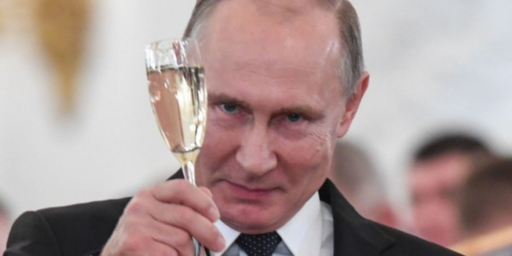
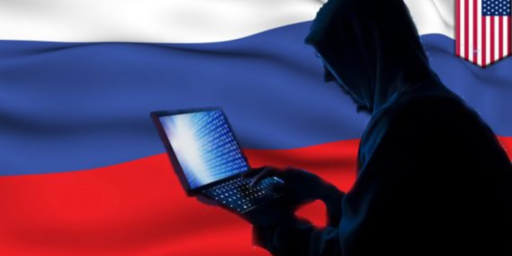
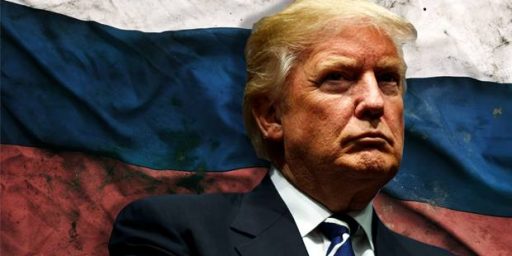
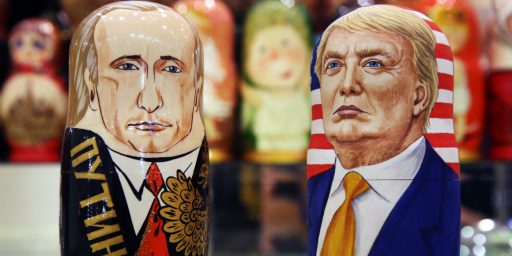
Of course Trump will continue to dismiss this. He can’t stand the thought that his election depended on Russian interference–or that his re-election depends on it.
Since Trump has met privately with Putin, there’s the possibility that Master instructed Cheeto to be quiet and not get in the way.
Have them call Fusion GPS and HRC, FGPS needs the the work and HRC is flush with cash. They were certainly willing in 2016.
Moral of the story: even Trump’s reptilian brain stem is aware of the possibility that he doesn’t *deserve* the prize that was stolen for him.
Even deeper question: Why does that undeserving status bother him in this case? It’s not like he hasn’t stolen before, coopted before, called in markers, rigged the system for himself, or any number of other things that advantage some over others. And it’s also clear–as our friend Guarneri has shown us above–that none of his supporters care. Not Drew, not JKB, not Boyd, not *hewhoshallnotbenamed,* not Florak. His answer–even in the dark night of his own soul should be “I won, WGAF how.” Yet, it’s not. Hmmmm…..
And:
At least since Reagan (I’m from the government; I’m here to help), Republicans have been working to undermine faith in the government. There’s a direct line from him to Trump.
@Kit:
I regard Reagan as our most disastrous president. He put a pleasant voice and avuncular face on an absurd ideology. Without Reagan, no W, no Trump.
“Have them call Fusion GPS and HRC, FGPS needs the the work and HRC is flush with cash. They were certainly willing in 2016.”
That’s a lot of trouble to go to when you can just have Don Jr and Kushner meet direct with the Russians. We know they have close personal experience (why settle for intermediaries) and you can keep it all in the family.
Steve
A story should be written warning all the countries about the countries which the US will be meddling in. Ask Karzai who handed him bags of cash. I’m sure we are bribing and pushing our will on a few dozen countries this week. Shocked bc we caught someone doing it to us? Focus on preventing it. Spare the finger pointing. Ask what the CIA is doing in Ukraine and Russia.
Ahh, the “I know you are but what am I?” defense…it’s amazing how often Trump and his toadies use this particular line of argument…